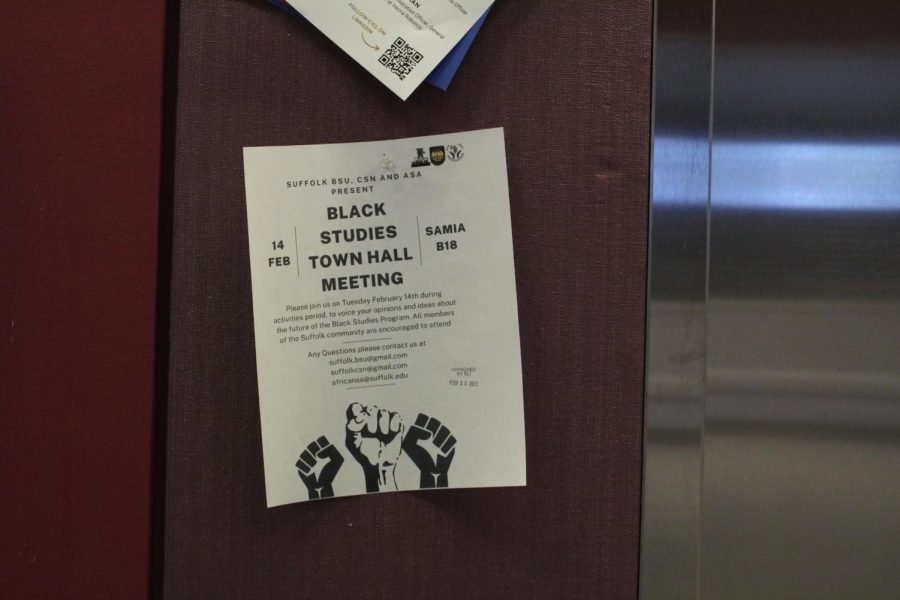Students voiced their opinions on racial justice, campus diversity and residence hall issues during the Oct. 28 Student Government Association meeting.
During open forum, Sarah Lawton, president of the Suffolk University chapter of the American Civil Liberties Union of Massachusetts, addressed SGA’s diversity committee regarding racial justice issues on campus and what SGA is doing specifically to address them.
“I know that Suffolk University just recently received an award for diversity and inclusion,” Lawton told senators. “However, I am kind of concerned that students of color might not also feel welcome here on campus, and I was curious if there were any initiatives made by the diversity committee in efforts to racial justice specifically.”
The committee’s chair, Nathaly Lemus, responded to Lawton’s comments.
“Funny enough, I have been thinking about this since that article came out [in The Suffolk Journal] regarding the Suffolk University athletics department,” Lemus said. “I have been working with President Angela [El-Jazzar] to talk to the athletics department and see if we can get faculty diversity training, as well as kind of conversing with students within the athletics department and see what they need as of right now and creating those discussions.”
Lawton then shared more concerns regarding SGA’s involvement around diversity, inclusion and racial justice issues.
“I just hope that whoever is on the committee takes initiative to not just lean on other organizations such as [the Center for Diversity and Inclusion] or [Black Student Union], specifically because they have their own agendas as well,” Lawton said. “That’s why I encourage all of the committee to take your own initiative and your own plans to emphasize outreach.
Lawton told senators that as a student of color, she does not feel SGA has represented her values of racial justice.
“Not only as a member of leadership, but as a student of color on campus, I don’t feel like student government has represented me in regards to racial justice,” Lawton continued. “I don’t think I need to keep going to CSDI to learn about diversity when I am diversity at this campus.”
Ashley Lindsey, director of facilities and campus planning, spoke to senators about residential life and housing issues across campus during the meeting. Students voiced their concerns about elevators, work order requests and mold in dorm rooms.
Lindsay explained that there was no actual mold found in vents, a point that was reiterated in an email sent to residents of Modern Theatre and 10 West on Monday. She added there have been no instances of mold being reported in student work order forms.
Elevators in Sawyer and Smith Hall still remain a problem, Lindsay said, with all elevators expected to be fully functional by the spring semester. Lindsay explained that much of the hold up around the elevators is because workers are unable to get specific parts from China needed to fix them.
One student at the meeting said one elevator is allegedly cracked and unsafe, but still in use, in Miller Hall. Lindsay said she had not heard anything about the cracked elevator and said that she would get back to the student and address the issue.
Lindsay later explained the importance of using the work order form to bring issues to the attention of facilities. Without the use of the form, facilities are unable to do their “due diligence,” she said.
The Student Judicial Review Board found previous bylaws passed by the senate were passed incorrectly. It ruled that SGA will revert back to its previous bylaws until the new bylaws can be properly passed in accordance to SGA procedure.
“The purpose for the passage of these updated legislative bylaws was to create a more fair and transparent method for the passage of legislation within the SGA body,” said Stephen Merrick, vice chair of SJRB. “We did not make these decisions lightly but did so to ensure our senate continues to … operate in a fair and transparent nature.”
Merrick added that SJRB did not find a constitutional issue in the new bylaws themselves, but urged attention to procedure in the senate moving forward.
“We in no way place blame on any individual member of the senate, any member of the executive board or the body as a whole,” he said. “We do however advise the senate to take the initiative to take more care to adherence to our governing documents in the future.”




















